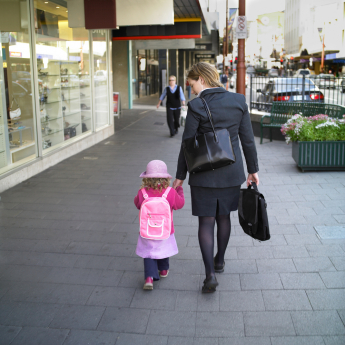Last year, I won another small research grant—A$3,700—and I was able to go overseas for research, which is great. But A$3,700 did not stretch to cover child care, and as a single parent, there was no father to leave them with. I had to juggle friends and family; in the end, I had to go for a much shorter period than I would have liked because of a lack of child care. And I won’t even start on the new DECRA funding package, which actually does allow for child care costs to be included in the budget. Except that means you have less to spend on research than someone who doesn’t have child care costs.
Everyone in the early-career stage has similar issues in finding writing time—they have bills to pay too. I’m only one of the many early-career researchers who are stuck in the casualised workforce. That means that there is only really 22 weeks a year of paid employment available to even earn an income—two semesters of 11 classes each. Twenty-two weeks out of 52. What magnifies it for so much for single parents is that there is no other set of shoulders to bear the burden, and I’m not just supporting myself. I have to feed and house my children. While I earn good money teaching, you never know if another contract will come, and thus, all the income earned is tucked away in savings for when I am not employed. On top of which, Centrelink only counts hours paid, not hours worked (even if my pay is listed as including several hours of prep time). Thus, I need to argue that I am meeting work requirements. And the tightening of ‘regulations’ proposed by the current government will make this worse, and could see me lose the child care benefit. making care for my son totally unaffordable.
I am lucky—my son is not yet six. That means when there is no teaching, I can still draw the single parent pension. It’s more than my single and childless friends get, but then they have other options that I don’t—living with parents, living at college, renting a room instead of a house. As thankful as I am that I get the pension, it’s not enough to actually raise children. This year, my son turns six. This means that I will be required to work at least 15 hours a fortnight. On a casual teaching contract, that equals eight classes a week. The most I’ve ever managed was seven and that semester near broke me during marking.
The fact is, as a single parent, I am the only income. There is no spousal finance to fall back on between semesters. I don’t receive child support—I can only imagine what I would do with the several thousands of dollars he owes me. And to get better fellowships—which might actually support my family or result in a long-term job—means finding this expensive space to write in, because without them the response is always ‘great project, not competitive in publications’. If you look at funding opportunities for ‘early career’ they are no longer really early career. How many individuals finish their PhD with six articles and a book contract—the current minimum to be competitive for an early-career grant? It is this crippling financial instability that is the hardest thing about being a single-parent, early-career researcher. The stress of being the sole provider can wear you down faster than anything else in this business. All early-career researchers face this, but it is heightened when the sole care of children is on our shoulders, and there is little understanding of it in the academic world. To outsiders, I’m just another casual early-career individual, on the same playing field as my peers trying to make a go of it in this uncertain world. They don’t see the falling apart school shoes I must somehow replace for my daughter, or the fact my son’s gut is hanging out of his shirt because he’s grown out of his clothes for the third time this year.



